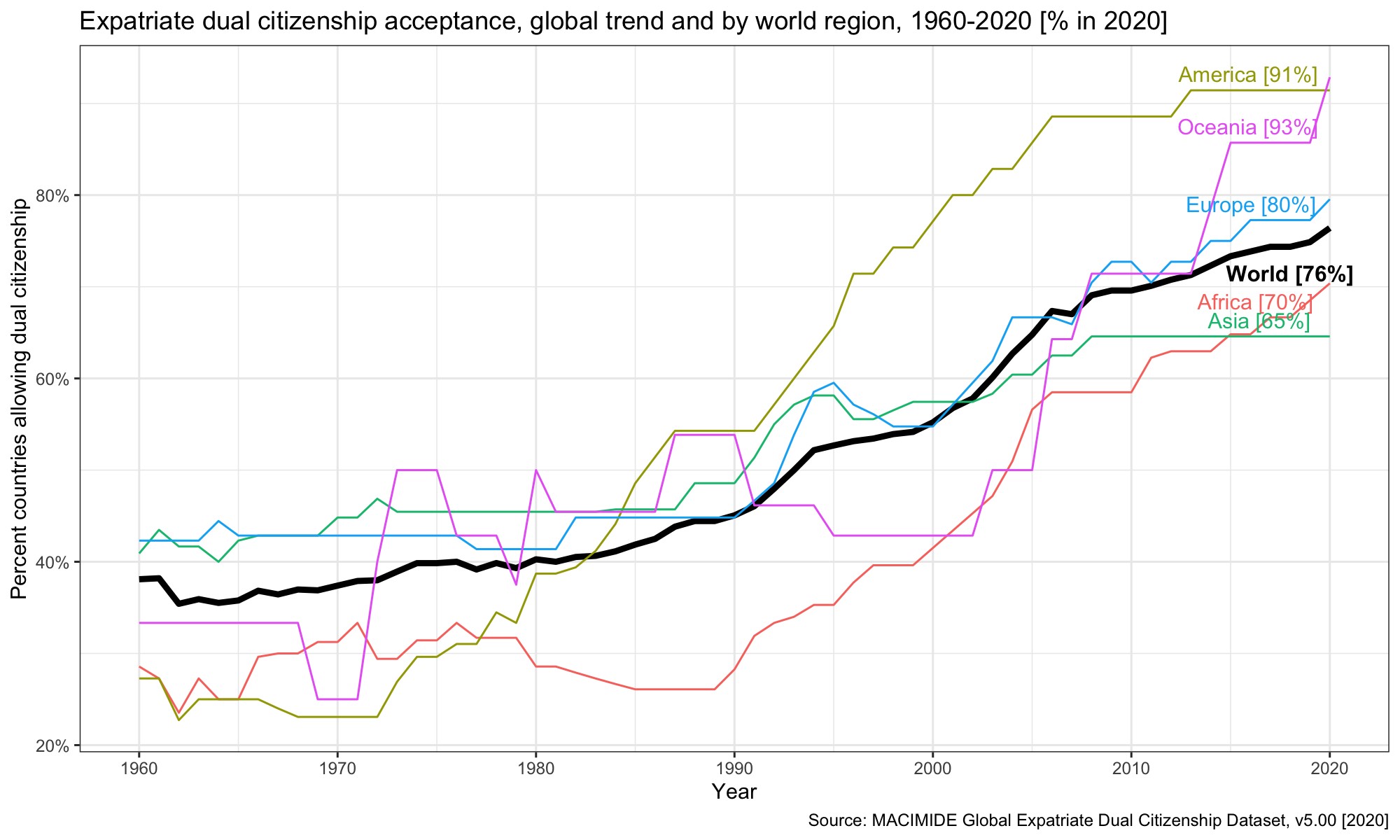Charting dual citizenship acceptance around the world, 1960-2020.
The MACIMIDE Global Expatriate Dual Citizenship Dataset charts the rules that existed in near all states of the world since 1960 with regard to the loss or renunciation of citizenship after a citizen of a respective state voluntarily acquires the citizenship of another state.
Global trend:
Based on around 10 thousand country-year observations in the Dataset, we observe that in 1960 a traditional negative approach towards dual citizenship was still represented in the majority of countries (62 percent) across the world. In this restrictive approach, a citizen who voluntarily acquires the citizenship of another state loses her or his citizenship. By 2020, however, 76 percent of countries maintain a more tolerant approach towards dual citizenship and allow citizens to voluntarily acquire the citizenship of another country, without automatic repercussions for the citizenship of origin.
Most of these states without a dual citizenship restriction allow citizens to voluntarily renounce their citizenship after they have acquired another citizenship (66 percent of all states), while a minority does not allow its citizens to renounce their citizenship (10 percent of all states). While the trend is in a broadly similar direction across world regions, dual citizenship acceptance has progressed faster in the Americas and Oceania and slower in Africa and Asia. Acceptance in Europe follows the global trend.
Over the past two decades, nearly all changes in policy have been towards a tolerant approach (with only one notable exception, in Slovakia, which restricted its dual citizenship policy in response to changes in neighbouring Hungary).
What you can find in the Dataset
The Dataset distinguishes between three types of basic rules (with some variations), of which the first type is restrictive towards dual citizenship and the second and third type permissive:
- The voluntary acquisition of another citizenship leads to the loss of the citizenship of the country of origin (expatriate dual citizenship restriction).
- The voluntary acquisition of another citizenship does not lead to the loss of the citizenship of the country of origin, but citizens have the possibility to voluntarily renounce their citizenship of origin (expatriate dual citizenship acceptance).
- The voluntary acquisition of another citizenship does not lead to the loss of the citizenship of the country of origin and citizens do not have the possibility to voluntarily renounce their citizenship of origin (expatriate dual citizenship acceptance).
The Dataset includes a categorical coding based on these three types of basic rules, as well as a binary coding which allows for comparison of countries with or without dual citizenship restrictions in their citizenship law.
Note that the Dataset in its current version only covers regulations with regard to the loss of citizenship. In a future iteration, in collaboration with the Global Citizenship Observatory, we aim to cover also regulations that cover dual citizenship restrictions for immigrants aiming to acquire the citizenship of a country through naturalisation.
Download the Dataset and the Codebook: The most recent version of the dataset, all previous versions and a detailed codebook are available through the Harvard Dataverse Network
We aim to regularly update the Dataset and will make updated versions available via the Harvard Dataverse.
Acknowledgement: The MACIMIDE Global Expatriate Dual Citizenship Dataset has been compiled by Maarten Vink, Gerard-René de Groot and Chun Luk of the Maastricht Center for Citizenship, Migration and Development, at Maastricht University. Research assistance has been provided by students of the Honours Programme at the Faculty of Arts and Social Sciences as well as by research assistants funded by the European Research Council under the project Migrant Life Course and Legal Status Transitions (grant agreement No 682626).
The dataset is made available freely for non-commercial use by the general public. We ask that users of the database acknowledge its source when using the data in their publications.
How to cite:
Vink, Maarten; De Groot, Gerard-Rene; Luk, Ngo Chun, 2015, “MACIMIDE Global Expatriate Dual Citizenship Dataset”, doi:10.7910/DVN/TTMZ08, Harvard Dataverse, V5 [2020].
For comments, corrections and suggestions on the dataset, Please contact Maarten Vink
For a comparative trend analysis see:
Maarten Vink, Arjan H Schakel, David Reichel, Ngo Chun Luk, Gerard-René de Groot, The international diffusion of expatriate dual citizenship, Migration Studies 7(3) 362-383, https://doi.org/10.1093/migration/mnz011.
See here some examples of other studies that have made use of the Dataset.
Links:
See Global Citizenship Observatory (GLOBALCIT) for more information about citizenship laws around the world.
See also the thematic section on Citizenship and Migration at the Migration Data Portal of the IOM’s Global Migration Data Analysis Centre (GMDAC).


